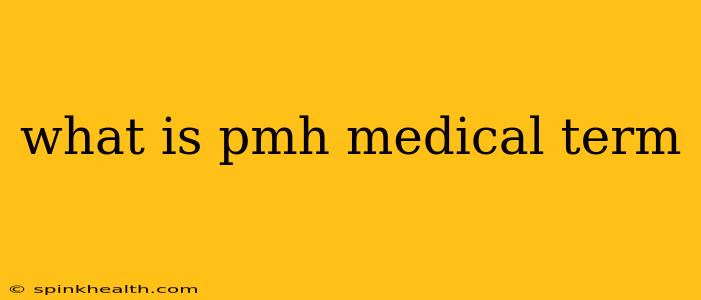What is PMH Medical Term? A Journey Through Patient History
The medical abbreviation PMH stands for Past Medical History. It's a crucial component of a patient's overall medical record, providing a snapshot of their health journey leading up to their current condition. Think of it as the foundation upon which doctors build their understanding of a patient's present health challenges. It's not just a list of ailments; it's a narrative, a story of how a person's body has responded to various health events throughout their life.
Let's delve deeper into what constitutes a patient's PMH and why it's so important.
What information is included in a PMH?
A complete PMH is far more than a simple list of diagnoses. It's a detailed account of significant past health events, including:
- Illnesses and Diseases: This encompasses any previous diagnoses, such as diabetes, hypertension, asthma, heart disease, cancer, or mental health conditions. It's vital to note the dates of diagnosis, severity, and treatment received.
- Surgeries and Procedures: Any surgical interventions, including the date, type of surgery, and any complications are documented. This also extends to less invasive procedures like colonoscopies or cardiac catheterizations.
- Hospitalizations: Records of past hospital stays, including the reason for admission, length of stay, and any significant events during the hospitalization.
- Allergies: A comprehensive list of allergies, both medication and environmental, is crucial to avoid adverse reactions. The severity of the allergic reactions should also be noted.
- Medications: A detailed list of current and past medications, including dosages and the reason for taking them. This also includes over-the-counter drugs and herbal supplements.
- Significant Family History: While not strictly part of the patient's PMH, family history of certain conditions (such as heart disease or cancer) is usually included as it can significantly impact a doctor's assessment.
- Immunizations: A record of received vaccinations and their dates is crucial for assessing immunity levels and preventative care.
Why is a detailed PMH so crucial?
Imagine a detective investigating a crime; a thorough understanding of the victim's past is essential. Similarly, a physician needs a comprehensive PMH to effectively diagnose and treat a patient. Here's why:
- Accurate Diagnosis: A well-documented PMH can help doctors rule out certain conditions and focus on the most likely diagnoses. For example, a patient with a history of asthma might experience similar symptoms to a heart condition, but the PMH clarifies the source.
- Effective Treatment: Knowledge of past treatments, allergies, and responses to medications is vital in crafting a safe and effective treatment plan. A history of adverse reactions to a particular drug can prevent a potentially dangerous situation.
- Risk Assessment: A PMH helps identify potential risks and vulnerabilities. A history of heart disease, for example, indicates a higher risk of future cardiac events.
- Prevention: Understanding past health issues enables doctors to recommend preventative measures, such as lifestyle changes or screenings, to reduce future health risks.
- Continuity of Care: A complete PMH ensures seamless transitions between healthcare providers, improving coordination and quality of care.
What if some information is missing from my PMH?
If you're unsure about aspects of your PMH, don't hesitate to contact your physician or previous healthcare providers. Gathering this information can be time-consuming, but it’s an investment in your long-term health.
In conclusion, the PMH is not just a medical formality; it's a living document that reflects your unique health narrative and plays a pivotal role in ensuring you receive the best possible medical care. Its completeness and accuracy are vital for your health and well-being.

